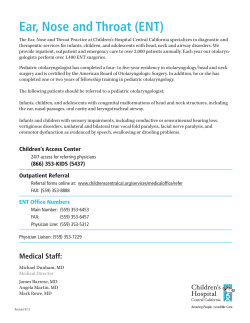
Epistaxis or nose bleed is the relatively common occurrence of... usually noticed when the blood drains out through the nostrils.... ABOUT EPISTAXIS AND NASAL CAUTERY
ABOUT EPISTAXIS AND NASAL CAUTERY WHAT IS EPISTAXIS? Epistaxis or nose bleed is the relatively common occurrence of haemorrhage from the nose. It is usually noticed when the blood drains out through the nostrils. It is a common paediatric complaint which is usually benign, self- limiting and spontaneous. Most incidents are not life threatening but can cause significant parental concern. Epistaxis usually occurs in children aged 2-10 year, with a peak between 3-8 years. There are 2 types of epistaxis. Anterior (most common) and posterior (less common but most likely to require medical attention). WHAT CAUSES EPISTAXIS? The cause of nose bleeds can be generally divided into 2 categories, local and systemic although a significant amount of nosebleeds occur with no obvious cause. LOCAL FACTORS Blunt trauma- usually a sharp blow to the face, sometimes accompanying a nasal fracture. Foreign bodies-with children this can be fingers when picking the nose. Inflammatory reactions-Such as acute respiratory tract infection, chronic sinusitis, allergic rhinitis or environmental irritants. SYSTEMIC FACTORS Allergies, infectious disease or hypertension. The primary cause of epistaxis in children is minor trauma, such as picking of dry nasal mucosa, with increased incidence in the winter months. Children with migraines have a higher incidence of epistaxis than children without migraines. HOW IS EPISTAXIS MANAGED? Most epistaxis in children is minor and tends to self resolve without any intervention other than direct pressure to the tip of the nose for 15minutes. This can be performed by a parent/carer. It is important to keep the child as calm as possible whilst doing this. Children who are suffering with recurrent epistaxis should be referred to an ENT specialist for further treatment. WHAT WILL HAPPEN AT THE CONSULTATION WITH THE ENT SPECIALIST? The specialist will examine the nasal cavity using an illuminated nasal speculum or otoscope. In most cases, the source of bleeding is clearly visible. If the child is co-operative, the ENT specialist may cauterise the nose. 1 WHAT IS NASAL CAUTERY? Nasal cautery is a common treatment for epistaxis . A caustic agent such as silver nitrate (chemical cautery), or an electrically charged wire such as platinum (electrocautery) is used to stop bleeding in the mucus membrane. Nasal cautery is performed to stop bleeding and prevent recurrence. It can be performed while the child is awake. Older children would benefit from this as they will not need a general anaesthetic. Younger children may not be as co-operative and may therefore require a general anaesthetic in order to carry out the procedure safely. This decision will be discussed at the clinic appointment. BEFORE YOUR CHILD’S OPERATION Your child will need to have 2-3 days off school to recover from the surgery and anaesthetic. Inform your child’s Consultant’s secretary if they are unwell with a cough, cold or sore throat in the week before the operation as it will be safer to postpone the operation for a few weeks. You and your child will attend a pre-operative assessment clinic a week before the scheduled surgery. Here, you will see a nurse who will obtain past medical/surgical history and be there to answer any questions you may have. You will then talk to a play specialist who will conduct a pre-operative talk. This includes how your child will go to sleep and giving you starving instructions. HOW IS THE OPERATION DONE? Your child will be asleep. The nose is cauterised using a silver nitrate stick or electro cautery, which will take about 20minutes. Your child will then go to a recovery room to be observed carefully until he/she wakes up from the anaesthetic. It will take about one hour in total. HOW LONG WILL MY CHILD STAY IN HOSPITAL? At Tameside General Hospital, the procedure is performed as a day case, so that your child can go home on the same day as the operation. If needed, for other medical reasons, your child may stay overnight. Your child will only be able to go home when they are eating and drinking and feels well enough. CARE AFTER THE OPERATION Some children feel sick- Medicine can be given for this which settles it quickly. Your child may have some discomfort- Painkillers should be given if your child is experiencing pain; do not give more than what is stated on the label. Try not to let your child pick, rub or blow the nose for a week- This will stop the disruption of the healing process. Apply the cream- This will have been prescribed and the nurse will show you how. This is to prevent infection. No boisterous play for 2 weeks. Bleeding can be serious- If your child’s nose begins to bleed, pinch just below the nasal bones whilst keeping the head forward. If the bleeding lasts longer than 15minutes and is more than a trickle, ring the ward or go to your nearest casualty department. REFERENCE Corbridge RJ(1998) Essential ENT Practice. A Clinical Text Leong S (2011) Paediatric Medicine- Managing Epistaxis in Children. www.gponline.com www.patient.co.uk- Nasal Cautery. 2 DOCUMENT CONTROLLED INFORMATION AUTHOR- CLAIR ARMITT DATE CREATED- JANUARY 2014 DIVISION/DEPARTMENT – CHILDREN’S SERVICES REFERENCE NUMBER- PAEDIATRICS 01 VERSION – 1.0 3
© Copyright 2025





















